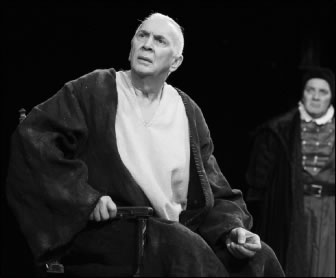By SCOTT HARRAH
A MAN FOR ALL SEASONS
Written by Robert Bolt
Directed by Doug Hughes
Through December 7
American Airlines Theater
227 West 42nd Street
212-719-1300, roundabouttheater.org
Three-time Tony winner Frank Langella gives another incandescent, crowd-pleasing performance as Sir Thomas More in this otherwise uninspired revival of Robert Bolt’s “A Man for All Seasons.” The brilliant drama, which originally debuted in 1962 on Broadway, tells the story of King Henry VIII seeking a divorce from wife Queen Catherine and how the monarch’s demands sent shockwaves throughout the Roman Catholic Church, England and Europe in the 1500s.
Bolt’s elegant dialogue and Langella’s riveting portrayal of a man torn between his own religious convictions and loyalty to the king manage to keep this scaled-down revival from totally disintegrating, but the threadbare sets and the uneven performances of some supporting cast members do little justice to the story. Those who have seen Paul Scofield’s Oscar-winning portrayal of More in the 1966 film adaptation will be seriously disappointed because this production hardly takes audiences back to the dark period in history when the justice system in England wasn’t exactly fair.
The two-act drama is talky, and without any solid set to anchor the show, “A Man for All Seasons” isn’t terribly exciting. That’s a shame considering that Langella really puts everything into his performance. Santo Loquasto’s Tudor-era set looks more like a wooden barnyard than scenes from 16th century England. Only candles and torches, and Catherine Zuber’s understated but historically accurate costumes, give us the feeling that we’re watching a period piece.
Maryann Plunkett, as More’s overwrought wife Alice, is the only other cast member who has much chemistry with Langella. She’s devoted to More but has difficulty accepting why he chooses, as England’s Lord Chancellor, to risk his family’s livelihood and his own life by defying the king’s wishes in the name of Catholicism. Plunkett as Alice displays a multitude of emotions, from love to disagreement to tearful horror as she realizes the cruel fate that awaits her husband.
Patrick Page plays King Henry VIII as a young, glamorous, high-spirited creature, much like the monarch was portrayed in the Showtime series “The Tudors,” but his one-dimensional performance seems totally out of place here. One would think a king that was so adamant about overruling Church doctrine to divorce his wife to marry Anne Boleyn – so she could give him a male heir – should be played as the stubborn tyrant he was portrayed as in the history books.
There are a few adequate supporting performances, such as Peter Bradbury as More’s servant non-trustworthy Matthew, and Zach Grenier is appropriately eerie, evil and curt as the king’s chief minister, Thomas Cromwell, but others are a little over the top. Triney Sandoval uses a silly, cartoonish accent as the Spanish Senor Chapuys, and Michel Gill overplays the role of the Duke of Norfolk.
The original play contained a narrator known as “The Common Man” who provided commentary on Sir Thomas More’s actions. Whether the deletion of the narrator is necessary is debatable, but it’s surprising that a distinguished director like Doug Hughes (who won a Tony for “Doubt”) would helm such a disenchanting version of “A Man for All Seasons.” This is a classic that deserved a much more lavish and textured revival, but luckily Frank Langella’s superlative performance saves it from being a total loss, and playwright Robert Bolt’s message about standing up for what one believes in is still topical today.
































